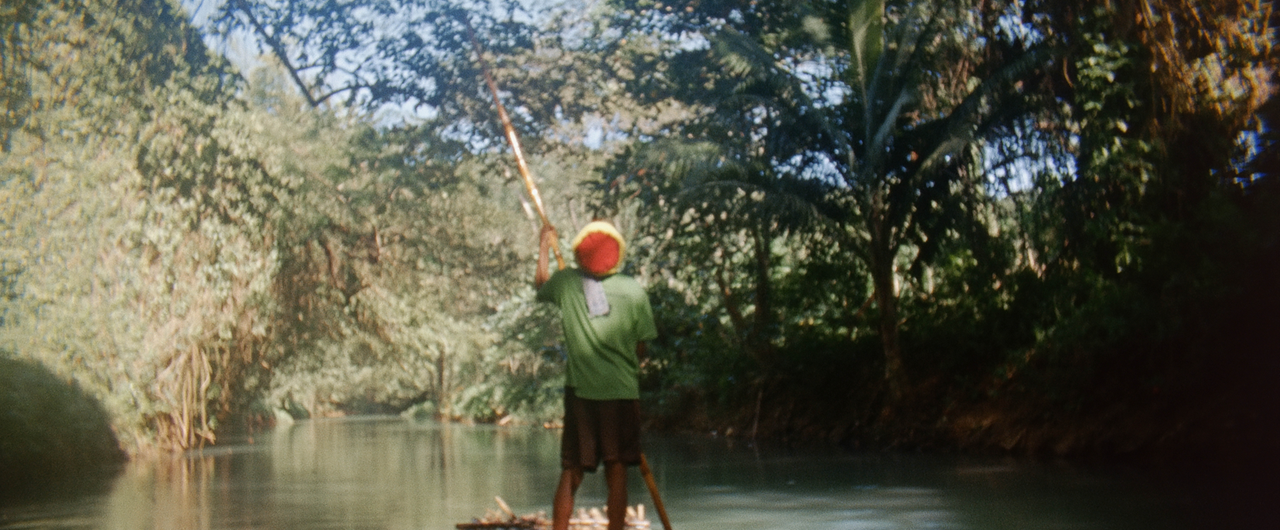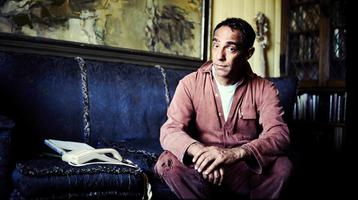
Cici Peng
In Toni Morrison’s 1995 essay 'The Site of Memory’, she writes: ‘All water has a perfect memory and it is forever trying to get back to where it was.’ Morrison’s essay refers to the Mississippi Delta, which was reshaped by European settlers in the early 18th century. Segments of the river were literally straightened in order to build plantations along its banks. The voracious desire for land ownership and profit re-ordered the landscape of the Mississippi through the subjugation and enslavement of Black people.
Hope Pearl Strickland’s a river holds a perfect memory (2024) explores the relationship between two geographical waterways — the Martha Brae and Falmouth Estuary in Jamaica, and various reservoirs and valleys in Northern England around Rochdale, Lancashire and Manchester. Expanding upon Morrison’s essay, Strickland’s dialectical tableau reveals how a complex racio-capital network binds these distant geographies together, reducing both land and people to fungible property in service of colonial and capital expansion. The abstraction of the landscape into units of extractive capital at the start of 19th century industrialisation in England is inseparable from the violent logic of the transatlantic slave trade. Together, Morrison’s prose and Strickland’s practice articulate a poetics of the Black Anthropocene: what if a river is not merely passive ground but an agent, carrying the memory of another land?
To propose an adage: a river film is composed of intersecting temporal and narrative drifts, which flows without a single centre. In Strickland’s work, autonomous historical streams occasionally meander and merge into a singular tributary, revealing their contingency before branching outwards into the sea. Through currents of movement and the murkiness of memory, a river film opens up a space composed of seepages. Brackish and fresh waters converge as deep ecological time intersects with industrial and personal histories. As both a Mancunian and Jamaican artist, Strickland subtly maps her own history across filmic fragments drawn from Manchester’s institutional archives and intimate 16mm footage captured while visiting her family in Jamaica. After the end credits, you can spot a wide shot of Strickland gazing at something intently, folding herself back into the work.

Hope Pearl Strickland, a river holds a perfect memory (2024), video still. Commissioned by Film and Video Umbrella and Touchstones Rochdale with support from HOME Manchester. Courtesy of the artist.
Through a shifting assemblage of materials and textures — archival photographs and documentaries, 16mm footage, digital cartography — Strickland attempts to move beneath the surface of our present terrain to unearth the ghost strata of the rivers’ memories. Fragments of a 1928 film on the Goyt Valley during the construction of the Stockport Corporation’s Water Scheme capture looming wooden scaffolds, holding back the ‘unruly’ waterway. By the 1970s in Northern England, a new landscape emerged: the industrial Northern city, with giraffe-necked factory chimneys exhaling smoke into a dense, bricked-up terrain. Like a palimpsestic X-ray, Strickland intervenes with her own LiDAR rendering of the English reservoirs, a three-dimensional map that reveals the natural meanders of the rivers constrained by decades of development. If the flood banks were removed and the floodplains reconnected, the river would return to the depressions of its former channels. It is not a flooding, but a remembering. It is not a remembering but a form of desire.
A leak, a trickle, a rush. On a sonic level, faint gurgles and the murmurs of streams lie beneath every image, lingering behind what can be seen. In the initial frames, our eyes strain toward the darkness of the Martha Brae at night, which appears nearly black, save for sudden flickers of bioluminescence sparking the water into blues and whites. From the very beginning, Strickland unsettles celluloid’s reliance on ‘light’ and the potential violence of revelation under the regime of the visible. For Strickland, a cinema that dwells in darkness is one that can attend to the invisible and the untraceable. The light that suddenly arrives feels protean, like echoes of a fractured past emerging from the watery, muddy passage.

Hope Pearl Strickland, a river holds a perfect memory (2024), video still. Commissioned by Film and Video Umbrella and Touchstones Rochdale with support from HOME Manchester. Courtesy of the artist.
Landscapes and human bodies structure each other in Strickland’s films. She is keenly aware of how the camera and its intruding eye can often permeate and eviscerate its subjects as she frequently interweaves her own footage with those drawn from colonial archives. Her work often calls attention to her own body’s presence behind the camera, as a Black woman observing the taxonomical ordering of colonial history. In her earlier film I’ll Be Back! (2023), we see Strickland holding open a diagram of a slave ship — a key document that propelled the abolitionist movement due to its shocking imagery. Why must the promise of progress constantly be staged through the spectacle of suffering?
In a river, Strickland tends to limit the camera’s exposing eye, framing bodies obliquely: we see only the boatsman’s back as he speaks about the continuing legacy of British colonialism, while steering a bamboo raft down the Brae. Pre-independence, this river served as a vital transport route linking Trelawny’s sugar plantations to the port of Falmouth; bamboo rafts once carried sugar and other crops bound for Europe. Today, the same rafts take tourists through a lush valley. Strickland’s camera turns to the river’s edges: children frolicking in rapids, tour boats gliding past alligators, fishermen’s vessels moored at the bay. The river is a site of labour and leisure, which, again, veers towards becoming a contested site of consumption. However, as Strickland returns to the image of the youths like a refrain, we are reminded that the river is a site of regeneration too, constantly remade by those who attend to its meanders, not in search of treasure but to swim in its abundance.
Cici Peng is a film critic and curator based in London. Her writing has appeared in frieze, Film Comment, Filmmaker Magazine, Financial Times among other publications. She also works for New York Film Festival’s Currents shorts, London Community Video Archive and Sine Screen.



